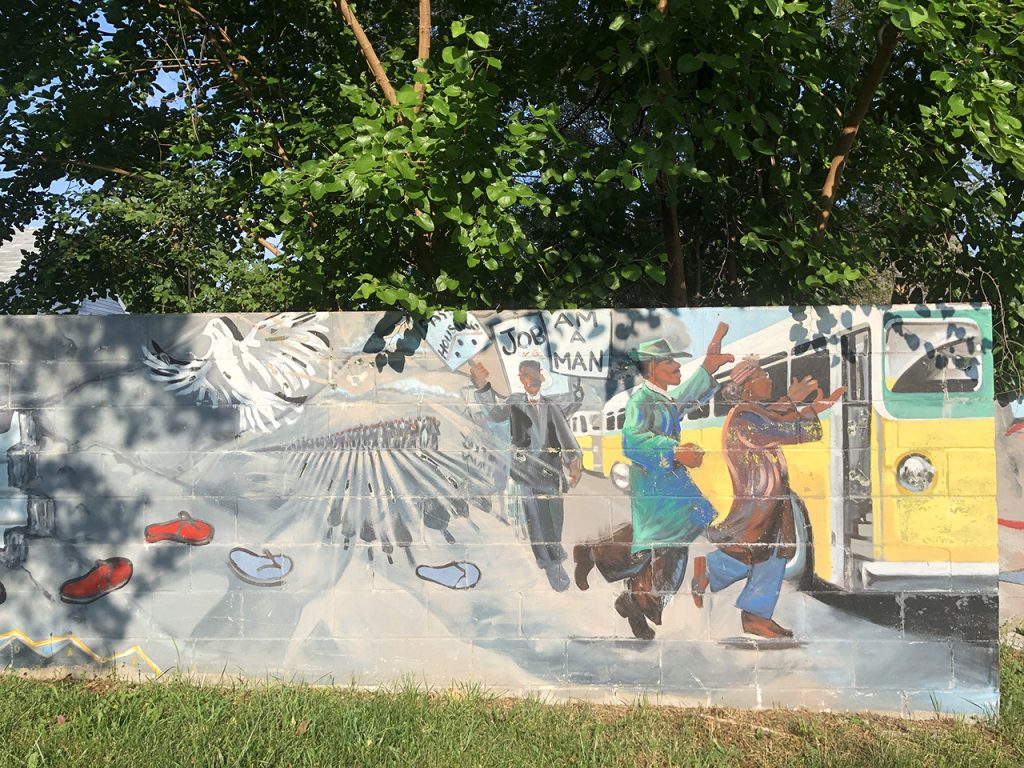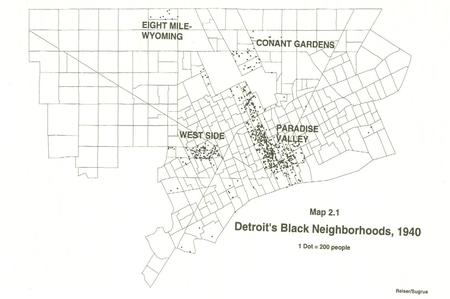Detroit’s Proposal R Asks Voters If City Should Create Task Force on Reparations
“It’s long overdue,” says Detroit City Council President Pro Tem Mary Sheffield, who introduced the resolution that put the question on the ballot. But if passed, it could face legal challenges or funding issues.

In the 1930s, the Federal Housing Administration put out a color-coded map of Detroit meant to communicate the riskiness of granting home loans in certain parts of the city.
Areas were shaded in green, blue, yellow and red. The green corresponded to where mostly white businessmen and professionals lived. These zones were considered low risk for mortgages. Black people could pretty much only live in the red parts.
“Reparations is making amends for a wrong and if we can agree that slavery was wrong, and if we can agree that segregation was wrong, then we should agree that reparations are in order.” –Karissa Wallace, Detroit Charter Revision Commission
Redlining, the practical and social infrastructure that pushes people of color into very specific neighborhoods, is just one example of how African Americans in Detroit have been discriminated against. There are countless others. Contracts were written into deeds of certain houses that said the properties could not be sold to Black people. Under the guise of Urban Renewal, Black Bottom, a predominately African American neighborhood, was leveled to make way for Lafayette Park and a freeway. And banks, for decades, could deny home and business loans to people simply because of their race. Plus, let’s not forget about slavery. That happened in Detroit, too.

On Nov. 2, there’s a proposal on the Detroit ballot looking to address these and other forms of racism. Proposal R asks if residents would like to create a committee to make recommendations to address historical housing and economic discrimination faced by the city’s Black community. The proposal, if passed, would create a reparations task force.
“I think the word reparations has become very charged,” says Karissa Wallace, in an online presentation about Proposal R that was put on by the nonpartisan group Citizen Detroit.
Wallace sat on the city’s Charter Revision Commission. The commission had written language about reparations and other progressive ideals in its draft city charter. That document, however, was rejected by voters in the August primary.
Wallace says she’s happy to see the idea of reparations live on in Proposal R.
“Reparations is making amends for a wrong and if we can agree that slavery was wrong, and if we can agree that segregation was wrong, then we should agree that reparations are in order,” she says.
Conversations Happening Elsewhere
Detroit City Council President Pro Tem Mary Sheffield introduced the resolution that put Proposal R on the ballot. She did so with support from the Michigan Democratic Black Caucus. Sheffield says if the proposal passes, she would create and chair a City Council task force that would also include non-city council members.
“I think that it’s long overdue, that we at least begin to see how we could discuss this issue and begin to right the wrongs to the Black community,” says Sheffield. “I mean, this is a conversation that is happening in other cities, is happening on the federal level, and I think we should be a part of that conversation.”
On the federal level, there are two bills proposing reparations. One is HR 40, originally introduced by the late Rep. John Conyers of Michigan. Earlier this year it was reintroduced by U.S. Rep. Sheila Jackson Lee of Texas. A companion bill, S 40, was introduced by U.S. Sen. Cory Booker of New Jersey around the same time. Despite Democratic majorities, the bills haven’t had much movement since then.
“I think that it’s long overdue, that we at least begin to see how we could discuss this issue and begin to right the wrongs to the Black community.” –Mary Sheffield, Detroit City Council
As for other cities and states, California launched its own committee to recommend reparations in June. Around the same time, Asheville, North Carolina, approved funding in its budget to pay for reparations and is working toward filling a 25-member commission.
In March, the city council in the Chicago suburb of Evanston voted to give $25,000 housing grants to Black people or descendants of Black people who lived in the city between 1919 to 1969. The funding comes from the city’s recreational marijuana sales tax.
Robin Rue Simmons, who was the Evanston alderwoman who originally introduced the ordinance, told MSNBC after it passed that reparations for Black people in America are long overdue.
“It was time when Rep. Conyers introduced it, 32 years ago or however long that’s been. But, the time is now. There is no other appropriate legislative tool to advance repair for the Black community. No version of equity. The time is now,” she said.
Evanston is said to be the first city in America to approve funding for reparations. But critics say it doesn’t go far enough. At the same time, two national conservative groups have threatened to sue it for discrimination.
Legal Hurdles Ahead
If Proposal R passes in Detroit, it could face its own legal challenges or funding issues. Wallace, who not only served on the Charter Commission but is also a corporate lawyer, says there’s language in Michigan’s constitution that says cities shall not discriminate against, or grant preferential treatment, based on race for public employment, education or contracting.
“Now, it’s unclear whether or not that would apply to any type of programming that the city would want to initiate in the space,” says Wallace. “But that is something that would need to be considered and potentially overturned in order to do the right thing here.”
Another hurdle for Proposal R could be public perceptions around reparations themselves.
“It’s really disturbing for some people, this idea that we would begin to cut checks for African Americans just because they’re African American,” says Anika Goss, CEO of the think tank Detroit Future City.
“Michigan’s largest city, and the largest African American population in the United States — that has experienced more discrimination here other than the Jim Crow South — does deserve the kind of capital that’s intentional and strategic in order to make the change that we want to see.” –Anika Goss, Detroit Future City
It’s unclear at this point if the Detroit task force, if established, would recommend checks, investments in housing and economic development, or both. But Goss says what is clear is that a debt is owed to Black Detroiters.
“Michigan’s largest city, and the largest African American population in the United States — that has experienced more discrimination here other than the Jim Crow South — does deserve the kind of capital that’s intentional and strategic in order to make the change that we want to see,” says Goss.
The Michigan Democratic Black Caucus says it polled 400 Detroiters on the issue. It says it found 51% of Black men, 54% of Black women and 56% of white women surveyed support reparations. At the same time, just 35% of white men surveyed support them.
Even if the proposal fails, Councilmember Sheffield says she doesn’t actually need support from voters to create a reparations task force. But she says if they do support it, then that is good for the city to know.
Trusted, accurate, up-to-date.
WDET strives to make our journalism accessible to everyone. As a public media institution, we maintain our journalistic integrity through independent support from readers like you. If you value WDET as your source of news, music and conversation, please make a gift today.
